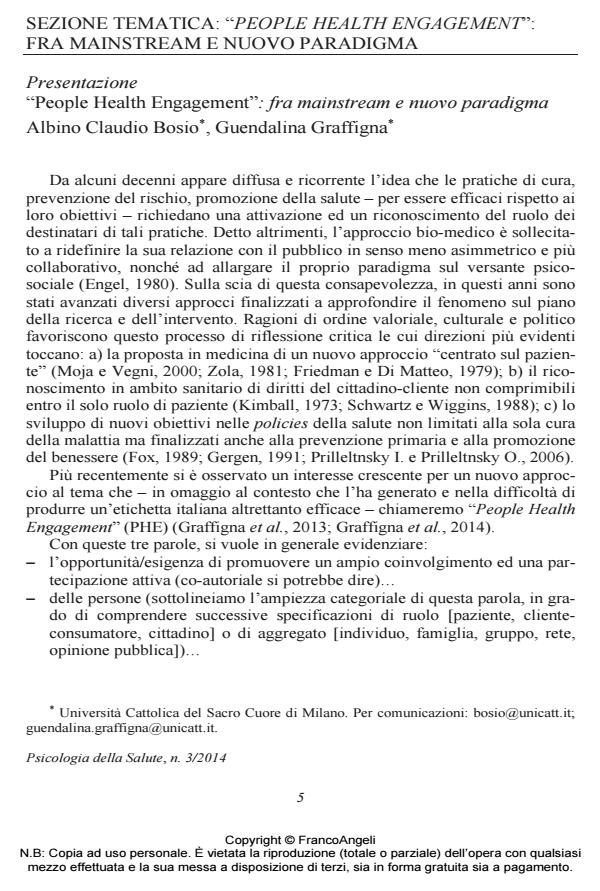Presentazione. "People Health Engagement": fra mainstream e nuovo paradigma
Titolo Rivista PSICOLOGIA DELLA SALUTE
Autori/Curatori Claudio Albino Bosio, Guendalina Graffigna
Anno di pubblicazione 2014 Fascicolo 2014/3 Lingua Italiano
Numero pagine 6 P. 5-10 Dimensione file 39 KB
DOI 10.3280/PDS2014-003001
Il DOI è il codice a barre della proprietà intellettuale: per saperne di più
clicca qui
Qui sotto puoi vedere in anteprima la prima pagina di questo articolo.
Se questo articolo ti interessa, lo puoi acquistare (e scaricare in formato pdf) seguendo le facili indicazioni per acquistare il download credit. Acquista Download Credits per scaricare questo Articolo in formato PDF

FrancoAngeli è membro della Publishers International Linking Association, Inc (PILA)associazione indipendente e non profit per facilitare (attraverso i servizi tecnologici implementati da CrossRef.org) l’accesso degli studiosi ai contenuti digitali nelle pubblicazioni professionali e scientifiche
- Argyris C. (1992). Organizational Learning, Cambridge. Mass.: Blackwell.
- Balint M., Hunt J., Joyce D., Marinker M. and Woodcock J. (1970). Treatment or diagnosis. London: Tavistock Publications.
- Barello S., Graffigna G. and Vegni E. (2012). Patient engagement as an emerging challenge for healthcare services: mapping the literature. Nursing Research and Practice, 1-7. http://dx.doi.org/10.1155/2012/905934
- Barello S., Graffigna G., Vegni E. and Bosio A.C. (2014). The Challenges of Conceptualizing Patient Engagement in Health Care: A Lexicographic Literature Review. Journal of Participatory Medicine, 6: e9.
- Bauman Z. (2005). Liquid life. Cambridge: Polity Press.
- Bosio A.C., Graffigna G. and Scaratti G. (2012). Knowing, learning and acting in health care organizations and services: Challenges and opportunities for qualitative research. Qualitative Research in Organizations and Management: An International Journal, 7: 256-274.
- Buntin M.B., Damberg C., Haviland A., Kapur K., Lurie N., McDevitt R. and Marquis M.S. (2006). Consumer-directed health care: early evidence about effects on cost and quality. Health Affairs, 25: 516-530.
- Coulter A. and Ellins J. (2007). Effectiveness of strategies for informing, educating, and involving patients. BMJ, 335: 24. DOI: 10.1136/bmj.39246.581169.8
- Cova B. and Dalli D. (2009). Working consumers: the next step in marketing theory? Marketing Theory, 9: 315-339.
- Engel G.L. (1980). The clinical application of the biopsychosocial model. American Journal of Psychiatry, 137: 535-44.
- Fox R.C. (1989). The sociology of medicine: a participant observer’s view. Englewood Cliffs: Prentice-Hall.
- Gergen K.J. (1991). The saturated self: dilemmas of identity in contemporary life. New York: Basic.
- Gherardi S. (2006). Organizational Knowledge: The Texture of Workplace Learning. Oxford, UK: Blackwell.
- Graffigna G., Morse J.M. and Bosio A.C. (2012). Engaging People in Health Promotion & well-being. New opportunities and challenges for qualitative research. Milano: Vita e Pensiero.
- Graffigna G., Barello S. and Riva G. (2013). Technologies for patient engagement. Health Affairs, 32 (6): 1172. DOI: 10.1377/hlthaff.2013.027
- Hibbard J.H., Stockard J., Mahoney E.R. and Tusler M. (2004). Development of the Patient Activation Measure (PAM): Conceptualizing and measuring activation in patients and consumers. Health Services Research, 39: 1005-1026.
- Graffigna G., Barello S., Riva G. and Bosio A.C. (2014). Patient Engagement: The Key to Redesign the Exchange Between the Demand and Supply for Healthcare in the Era of Active Ageing (pp. 85-95). In Riva G., Ajmone Marsan P. and Grassi C. (eds.). Active Ageing and Healthy Living. A Human Centered Approach in Research and Innovation as Source of Quality of Life. Amsterdam (Netherlands): IOS Press.
- Kimball C.P. (1973). Medical education as a humanizing process. Academic Medicine, 48 (1): 71-77. DOI: 10.1097/00004999-197301000-0001
- March J.G. (1988). Decisions and Organizations. Oxford: Basil Blackwell.
- Marcum J.A. (2008). An introductory philosophy of medicine: Humanizing modern medicine. Springer.
- Moja E.A. e Vegni E. (2000). La visita medica centrata sul paziente. Milano: Raffaello Cortina
- Editore. Morse J.M. and Niehaus L. (2012). Combining Qualitative Methods for Mixed-Method Designs. In Munhall P. (ed.). Qualitative Nursing Research, 5th ed. (pp. 571-584), Sudbury, MA: Jones & Bartlett.
- Prilleltnsky I. and Prilleltensky O. (2006). Promoting well-being. Linking Personal, Organizational and Community Change. New Jersey, Canada: John Wiley & Sons.
- Richards T., Montori V.M., Godlee F., Lapsley P. and Paul D. (2013). Let the patient revolution begin. BMJ, 346: 2614. DOI: 10.1136/bmj.f261
- Riva G., Ajmone Marsan P. and Grassi C. (2014). Active Ageing and Healthy Living. A Human Centered Approach in Research and Innovation as Source of Quality of Life. Amsterdam (Netherlands): IOS Press.
- Schwartz M.A. and Wiggins O.P. (1988). Perspectivism and the methods of psychiatry. Comprehensive Psychiatry, 29: 237-251.
- Vargo S.L. and Lusch R.F. (2008). Service-dominant logic: continuing the evolution. Journal of the Academy of Marketing Science, 36: 1-10.
- Walker A. (2008). Commentary: The emergence and application of active aging in Europe. Journal of Aging & Social Policy, 21: 75-93.
- Wiederhold B.K., Riva G. and Graffigna G. (2013). Ensuring the Best Care for Our Increasing Aging Population: Health Engagement and Positive Technology Can Help Patients Achieve a More Active Role in Future Healthcare. CyberPsychology and Behavior, 16: 411-412. World Health Organization (2011). http://www.who.int/about/en/
- Integrating Technology in Positive Psychology Practice Serena Barello, Julia Menichetti, Guendalina Graffigna, pp.59 (ISBN:9781466699861)
- Health Care Delivery and Clinical Science Serena Barello, Julia Menichetti, Guendalina Graffigna, pp.62 (ISBN:9781522539261)
Claudio Albino Bosio, Guendalina Graffigna, Presentazione. "People Health Engagement": fra mainstream e nuovo paradigma in "PSICOLOGIA DELLA SALUTE" 3/2014, pp 5-10, DOI: 10.3280/PDS2014-003001